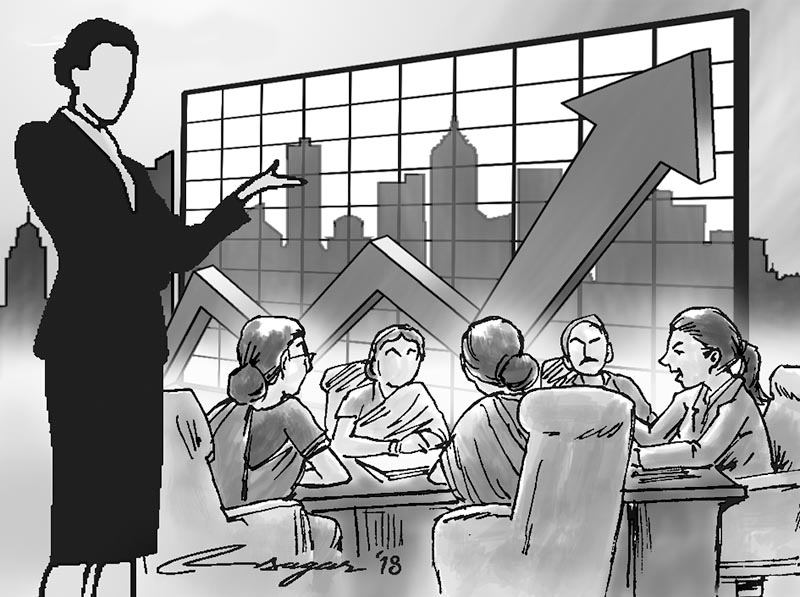Women entrepreneurship: Road to equality & development
In the current global context, where a tree of problems stems from the issue of gender inequality, women empowerment through entrepreneurship is indeed the way forward. Women’s participation in the economy stimulates wider benefits
Somewhere amidst the peaceful mountains of Nepal, echoes silence the cry of a woman—of a woman who has been beaten by her husband, a woman who has been sold by her father, a woman who has been forced to forgo her education. Violence, abuse of basic human rights and discrimination are still an everyday reality for many Nepali girls and women. Such gender disparate practices are what hinder sustainable development of a nation.
A research conducted by the World Bank highlights the negative impacts of social gender disparities on the economy of a nation stating it as one of the main factors for lower economic growth and hindrance to poverty reduction. It is generally accepted that women’s economic empowerment is a game changer when it comes to such biases. Being economically empowered means a woman is self-reliant who can stand up against the existing insecurities. Empowering women economically contributes in their individual development while the benefits are felt in global economy as well. A study by McKinsey Global Institute suggests an increase of $28 trillion, or 26 per cent, to annual global GDP by 2025, under a “full potential” economic scenario where both men and women participate equally in the economy.
Women entrepreneurship, being one of the core drivers of economic empowerment, is a vital tool for uplifting women’s status within a society, as it contributes in the overall economic development of a country. A general estimation of Nepal’s population indicates a 50-50 divide between male and female populace. Despite this equality displayed in numbers, women in Nepal lag behind their male counterparts in many domains, and entrepreneurship is one of them. While Nepali women’s participation in entrepreneurial activities has been on the rise, the move up the slope has been a slow one.
The Nepal Labour Force Survey (1998/99) showed only 12.8 per cent of the total Small Medium Enterprise (SMEs) in Nepal to be partially or fully owned by women. Such low representation of women in this field has been attributed to various challenges that women face in our country in terms of access to finance, access to collateral, developing awareness of their rights, capacity building, social restrictions and unfavourable laws and regulations.
Traditionally a patriarchal nation, Nepal though has evolved over the years, gaping gender gaps in its social, political and economic structures are still a blot the society and hindering the progress towards gender parity. Ironic as it may sound it is true that while equality begins with both men and women’s economic empowerment, it is equally valid that economic empowerment requires a certain level of equality to flourish. For Nepal to run a well-oiled economy, it cannot afford to neglect half of its population. Understanding this, joint efforts to negate gender inequality are being made by the government, INGOs, NGOs, and other development partners.
The government of Nepal has introduced many gender-based initiatives, policies and micro-financing schemes to create a more conducive environment for interested women entrepreneurs, eg the Civil Code Bill which entitles equal property rights to both daughters and sons, 15 per cent income tax exemption for enterprises with more 50 per cent native women employees, provision of collateral free loans at an interest of 6 per cent. NGOs such as the Federation of Women Entrepreneur’s Associations of Nepal (FWEAN) and South Asian Women Development Forum (SAWDF) have also been active in facilitation of women empowerment advocacy and supporting women-run enterprises.
SAWDF, recently, in collaboration with ICIMOD, also conducted an exploratory study called “Reflections on Policies for Women Small and Medium Entrepreneurs: Status, Challenges and Opportunities in Hindu Kush Himalayas and SAARC Region” highlighting the need for mapping and data collection of women SMEs for a more gender-sensitive policy design.
While these initiatives have been bearing fruits, Nepal still has a long way to go on its journey to becoming an equal and just society. Women being the caretakers of a household, women empowerment could be a great source for nurturing gender equality and empowering a woman could create ripple effects with the benefits trickling down to her whole family.
In conclusion, as said by Sheryl WuDunn, an American business executive, writer, lecturer and Pulitzer Prize winner, “Women are not the problem. They’re the solution,” in the current global context, where a tree of problems stems from the issue of gender inequality, women empowerment through entrepreneurship is indeed the way forward. Women’s participation in the economy stimulates wider benefits. Economic development and gender equality go hand-in-hand.
A society where there is greater gender equality offers better socioeconomic opportunities for women, which then grow faster and more equitably. The benefits are then felt across a large spectrum—there are gains in poverty reduction, environmental sustainability, consumer choice, innovation and decision-making. That’s why women empowerment is central to the empowerment and prosperity of a community.
Rijal is president of South Asian Women Development Forum






